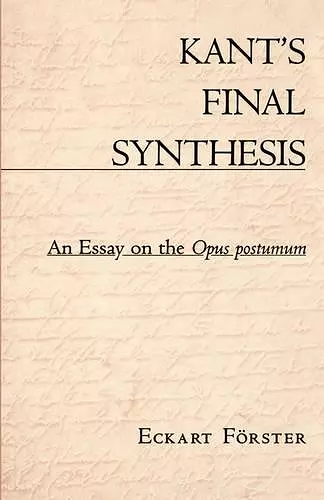Kant’s Final Synthesis
An Essay on the Opus postumum
Format:Paperback
Publisher:Harvard University Press
Published:15th Oct '02
Currently unavailable, and unfortunately no date known when it will be back

In Kant’s Final Synthesis, Eckart Förster explores the profound significance of Kant’s Opus postumum, revealing its crucial role in his philosophical development.
This book is the first comprehensive English-language examination of Kant’s Opus postumum and its significance within his philosophical legacy. Author Eckart Förster offers meticulous analyses of the central issues presented in the Opus, shedding light on the remarkable continuity and intricate development of Kant's transcendental philosophy as it evolves towards its ultimate synthesis. Over recent decades, the importance of this text has become increasingly apparent, revealing its critical role in understanding Kant's broader philosophical framework.
Initially, Kant approached the Opus postumum with the intention of addressing a relatively minor philosophical issue. However, as he delved deeper, he found himself compelled to revisit nearly all the fundamental challenges of his critical philosophy. These include inquiries into the objective validity of categories, the dynamics of matter, the nature of space and time, and the refutation of idealism. Kant's exploration ultimately led him to consider the self and its agency, living organisms, practical postulates, the concept of God, and the relationship between theoretical and practical reason, culminating in a cohesive philosophical perspective.
Förster's insightful study emphasizes the significance of Kant's conviction that these long-standing problems could be coherently resolved. By connecting the discussions in Opus postumum with Kant’s major published works, Förster not only respects Kant’s intellectual journey but also invites readers to engage deeply with the philosophical implications of his findings. This book serves as a vital resource for anyone interested in the complexities of Kant’s thought and its lasting impact on philosophy.
In 1993, as one volume in the Cambridge edition of the works of Immanuel Kant, there appeared the first-ever English translation of this, Kant’s last major work; selected and edited, with an introduction and notes, by Eckart Förster… This in itself was a great service to English-speaking students of Kant; and Förster has now more than doubled their indebtedness to him by publishing Kant’s Final Synthesis: An Essay on the Opus postumum; for the last work itself, more than any other of Kant’s, stands sadly in need of sympathetic elucidation. -- P. F. Strawson * Times Literary Supplement *
Förster’s reading is original, illuminating, and powerful. It represents the present state of the art in our evolving understanding of Kant’s late thought. -- Michael Friedman * Inquiry *
In Kant’s Final Synthesis Eckart Förster lays out the problems posed by Kant’s posthumous opus with unrivalled clarity and succinctness, and sketches solutions as persuasive as any to date, both textually and contextually. -- Wayne Waxman * Philosophical Quarterly *
- Nominated for Aldo and Jeanne Scaglione Prize for Studies in Germanic Languages and Literatures 2001
ISBN: 9780674009813
Dimensions: 227mm x 124mm x 15mm
Weight: 318g
230 pages